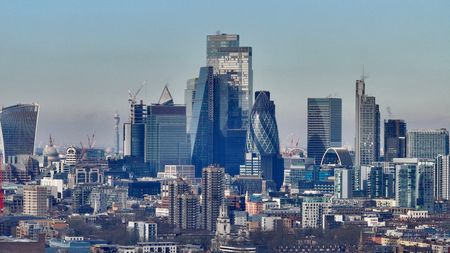By Samuel Indyk and Nell Mackenzie
LONDON (Reuters) -Britain’s unloved investment trusts may be nearing a turning point as falling interest rates, a possible government drive to boost share ownership, and activist pressure converge to unlock value.
Investment trusts, which pool shareholder funds into diversified portfolios, have been a fixture of Britain’s markets for 150 years. They aim to deliver steady dividend income but often trade below the value of their underlying assets.
Average discounts to net asset value (NAV) have been stuck in double digits for over three years – the longest stretch in at least three decades.
With investment trusts including the likes of Tritax Big Box and RIT Capital Partners making up nearly a third of the FTSE 250, the index’s sluggish 4.3% rise this year highlights the sector’s underperformance.
According to the Association of Investment Companies (AIC), the average investment trust share price trades at 13% below NAV compared to a historical average of about 4% from 2015 to 2021.
POLICY SHIFTS AND MARKET HEADWINDS
Discounts widened during the Bank of England’s interest rate-hiking cycle from 2021 to 2023, as higher-yielding, lower-risk assets lured investors away.
The discounts also reflect broader malaise in UK equities, which have suffered persistent outflows, a dearth of new listings and a surge in deals taking companies private.
UK equities have seen $32.4 billion in outflows in 2025, according to Barclays Research and EPFR data.
London’s $380-billion FTSE 250 mid-cap index has lagged this year, rising just 4.3% compared to a 17% rise for the larger-cap international FTSE 100 index. It’s also cheaper, trading at 12.7 times earnings, compared to the FTSE 100 which trades at 17.4 times earnings.
But falling interest rates could change the picture, investors and analysts said.
The BoE has signalled another potential rate cut in December, and possibly more next year.
“If rates were to come down meaningfully, that’s going to have a benefit on the sector as a whole,” said Matt Ennion, head of fund research at Quilter Cheviot.
Finance minister Rachel Reeves is also expected to unveil measures in her November budget to encourage pension funds to invest domestically and tighten rules around tax-free savings products – potentially funnelling more household cash into equities.
“The UK just doesn’t have much domestic investment in equities broadly,” said Sharon Bell, senior European equity strategist at Goldman Sachs.
“The key thing is to get more investment into risk assets which give investors longer-term better returns.”
DISCOUNTS AND ACTIVIST PRESSURE
Activist investors are adding to the positive momentum. Boaz Weinstein’s Saba Capital has campaigned against trusts he calls “underwhelming”.
“Since we began, manager behaviour has been better for shareholders, especially in the funds we own,” Weinstein said.
Smithson Investment Trust, of which Saba holds about 16%, announced it will convert from a closed-ended fund to an open-ended fund, allowing investors to exit at NAV minus costs. Its shares rose more than 7% following the announcement.
“We think this proposal provides a blueprint as to the type of option that boards should consider in order to enhance shareholder value, in situations where discounts in excess of 10% persist over a long period of time,” said Stifel analyst Iain Scouller.
Boards are also deploying share buybacks more aggressively. Winterflood Securities reports year-to-date share buybacks have reached a record 8.6 billion pounds ($11.54 billion), 35% above the same period in 2024 and already greater than last year’s total.
“Boards that are more active in the way they’re engaging and responding to investors have benefitted and been able to either narrow or avoid widening discounts,” Winterflood research analyst Alex Trett said.
With monetary policy easing, government incentives on the horizon, and activists forcing change, Britain’s investment trusts may finally be ready to shake off years of neglect.
($1 = 0.7630 pounds)
(Reporting by Samuel Indyk, additional reporting by Nell Mackenzie and Kanchana Chakravarty; Editing by Amanda Cooper and Elaine Hardcastle)











